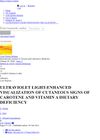 February 2024 in “Animals”
February 2024 in “Animals” Giving selenium yeast to pregnant goats leads to better hair growth and cashmere quality in their babies.
March 2021 in “World rabbit science” Adding 0.2% taurine to Angora rabbits' diet improves wool production and overall health.
 October 2012 in “European Neuropsychopharmacology”
October 2012 in “European Neuropsychopharmacology” People with early psychosis eat more calories, saturated fat, and sugar, and the drug olanzapine may lead to eating even more calories.
30 citations,
September 2016 in “Aging Cell” Low selenium levels can extend lifespan but worsen health issues.
 6 citations,
March 2011 in “Experimental Dermatology”
6 citations,
March 2011 in “Experimental Dermatology” Too much or too little selenium in the diet can cause hair loss and graying in mice.
 February 2022 in “International journal of KIU”
February 2022 in “International journal of KIU” Certain genes and nutrients like vitamin D, zinc, and omega fatty acids affect COVID-19 severity and infection risk.
 January 2020 in “Asian Journal of Basic Science & Research”
January 2020 in “Asian Journal of Basic Science & Research” Nutrease powder, a high-protein, low-carb supplement, can help manage Polycystic Ovary Syndrome symptoms, regulate periods, improve ovulation, and restore fertility.
 17 citations,
April 2004 in “Acta Clinica Belgica”
17 citations,
April 2004 in “Acta Clinica Belgica” UV light makes skin signs of lack of carotene and vitamin A more visible.
2 citations,
January 2022 in “Italian journal of dermatology and venereology” Unhealthy lifestyle and diet may increase the risk of early hair loss in young men.

North American ginseng extract helped regrow hair in balding mice.
June 2020 in “The journal of investigative dermatology/Journal of investigative dermatology” Different diets change the fat composition in mouse skin, often reducing beneficial omega-3 fatty acids.
11 citations,
October 2020 in “Sultan Qaboos University medical journal” Bariatric surgery helps with weight loss but can cause complications and nutritional deficiencies.
33 citations,
January 2001 in “Critical care clinics” Dietary lipids affect inflammation and are crucial for normal cell function and immune health.
33 citations,
November 1999 in “The Veterinary clinics of North America. Small animal practice/Veterinary clinics of North America. Small animal practice” Dogs with zinc-responsive dermatosis need zinc supplements or dietary changes for treatment.
2 citations,
January 2018 in “Elsevier eBooks” Probiotics and dietary changes can help treat acne.
 271 citations,
September 2008 in “Nutrition reviews”
271 citations,
September 2008 in “Nutrition reviews” Vitamin D receptor interacts with certain dietary components to help prevent diseases and regulate hair growth.
 99 citations,
December 2010 in “Journal of The European Academy of Dermatology and Venereology”
99 citations,
December 2010 in “Journal of The European Academy of Dermatology and Venereology” The document concludes that certain genetic mutations and dietary factors are involved in acne development, and treatments like isotretinoin and diet changes can help manage it.
January 2021 in “Agrobiological records” Biofortifying fruits and vegetables with selenium can improve dietary intake and prevent health issues.
 August 2018 in “Ayurlog: national journal of research in ayurveda science”
August 2018 in “Ayurlog: national journal of research in ayurveda science” Polycystic Ovarian Syndrome (PCOS) can be effectively treated with Ayurvedic dietary management.
 1 citations,
September 2003 in “The Journal of the American Animal Hospital Association/Journal of the American Animal Hospital Association”
1 citations,
September 2003 in “The Journal of the American Animal Hospital Association/Journal of the American Animal Hospital Association” Transdermal fluoxetine is less effective in cats, clomipramine may help with feline alopecia, younger dogs often start fights, dietary changes can reduce cribbing in horses, negative aggression tests in shelter dogs predict good behavior, many older cats show cognitive issues, and fluoxetine or paroxetine can improve canine anxiety.
466 citations,
June 2009 in “Experimental dermatology” We now understand more about what causes acne and this could lead to better, more personalized treatments.
 207 citations,
April 2006 in “Journal of The American Academy of Dermatology”
207 citations,
April 2006 in “Journal of The American Academy of Dermatology” Iron deficiency may be related to hair loss, but there's not enough evidence to recommend iron screening or supplements for all hair loss patients.
200 citations,
August 2009 in “Experimental dermatology” Eating high-glycemic foods and drinking milk may worsen acne by increasing insulin and IGF-1 levels.
 98 citations,
October 2012 in “Dermatologic Clinics”
98 citations,
October 2012 in “Dermatologic Clinics” Eating the right nutrients can improve hair health, but taking extra supplements usually doesn't help unless you have a deficiency.
 93 citations,
April 2003 in “Proceedings of the National Academy of Sciences of the United States of America”
93 citations,
April 2003 in “Proceedings of the National Academy of Sciences of the United States of America” Fatty acid transport protein 4 is essential for skin and hair development.
 37 citations,
June 2021 in “Journal of the European Academy of Dermatology and Venereology”
37 citations,
June 2021 in “Journal of the European Academy of Dermatology and Venereology” Adult skin quickly reacts to short-term environmental and internal stress, leading to various skin issues and the need for protective measures.
 30 citations,
July 2010 in “Experimental Dermatology”
30 citations,
July 2010 in “Experimental Dermatology” Polyamines are important for hair growth, but more research is needed to understand their functions and treatment potential.
 18 citations,
February 2001 in “Journal of International Medical Research”
18 citations,
February 2001 in “Journal of International Medical Research” Hairgain® significantly increased hair growth and was well-tolerated by individuals with hair loss.

















